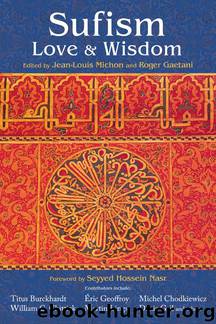Sufism by Jean-Louis Michon & Roger Gaetani

Author:Jean-Louis Michon & Roger Gaetani
Language: eng
Format: epub
Publisher: World Wisdom
The clear problem with this solution—that every woman on the path is, so to speak, inwardly a man—is that it denies any natural or normative understanding of the mystical path for women. Only women who are highly exceptional, who are in some sense “not really women” can have the vocation to “walk upon the path.” Frithjof Schuon notes that to conceive of a saintly woman as somehow a man is “absurd in itself, but defensible”13 from a certain perspective; however, he further states that “to allege that the woman who is holy has become a man by the fact of her sanctity, amounts to presenting her as a denatured being: in reality, a holy woman can only be such on the basis of her perfect femininity. . . .”14
The identification of spiritual realization with masculinity is furthered by the use among certain mystical writers, including Ibn ʿArabī, of the term rajuliyya or “manliness,” to refer to those who have reached the highest spiritual station, the state of the “Perfect Man” or the insān al-kāmil.15 While Ibn ʿArabī notes that he is not using the term in a gender specific sense, and that women as well as men might reach this state of spiritual “manliness,” it is significant that the term itself employs the gender specific Arabic word for “man.” Such usage would seem, in effect, to be a contradiction in terms. For the term rajul, meaning man in a purely masculine sense, is not the same as the term insān used in the phrase “perfect man.” Insān is precisely not gender specific. It refers to man in the universal sense; thus every human being—male or female—by virtue of being human, has the potential to reach the state of the “perfect man.” If the hierarchical relationship between intellect and the passionate soul are reflected in the physical and social hierarchy of men and women in the traditional Islamic view, then the gender neutrality of the insān al-kāmil, or the “perfect man” that all true seekers strive to become is an affirmation of the profound spiritual equality between men and women that is clearly indicated in the Quran. The prototype of the insān al-kāmil, or “perfect man,” is not the masculine Adam as opposed to the feminine Eve, but the as-yet-undifferentiated Adam, the “single soul” from which both men and women were created. This primordial Adam, this undifferentiated human soul, was made “in the image of God” and so reflected on a human plane the perfection of the Divine. As God contains both masculine and feminine qualities in Islam—possessing both names of “majesty,” such as Judge, King, Lord, the Transcendent, the Strong, and names of “beauty,” such as Merciful, Compassionate, Intimate Friend, the Gentle, the One Who Loves—so too did this primordial Adam contain both masculine and feminine qualities and virtues. Thus it stands to reason that in order to reach this state of original Adamic purity, man must attain all of the virtues, masculine and feminine alike. It is not enough
Download
This site does not store any files on its server. We only index and link to content provided by other sites. Please contact the content providers to delete copyright contents if any and email us, we'll remove relevant links or contents immediately.
The History of Jihad: From Muhammad to ISIS by Spencer Robert(2628)
Nine Parts of Desire by Geraldine Brooks(2369)
The Turkish Psychedelic Explosion by Daniel Spicer(2357)
The First Muslim The Story of Muhammad by Lesley Hazleton(2271)
The Essential Rumi by Coleman Barks(2047)
1453 by Roger Crowley(2031)
The Last Mughal by William Dalrymple(1858)
Trickster Travels: A Sixteenth-Century Muslim Between Worlds by Davis Natalie Zemon(1847)
Muhammad: His Life Based on the Earliest Sources by Martin Lings(1646)
God by Aslan Reza(1644)
by Christianity & Islam(1633)
A Concise History of Sunnis and Shi'is by John McHugo(1567)
No God But God by Reza Aslan(1545)
Magic and Divination in Early Islam by Emilie Savage-Smith;(1534)
The Flight of the Intellectuals by Berman Paul(1503)
Nothing to Envy by Barbara Demick(1450)
Art of Betrayal by Gordon Corera(1431)
What the Qur'an Meant by Garry Wills(1394)
Getting Jesus Right: How Muslims Get Jesus and Islam Wrong by James A Beverley & Craig A Evans(1342)
